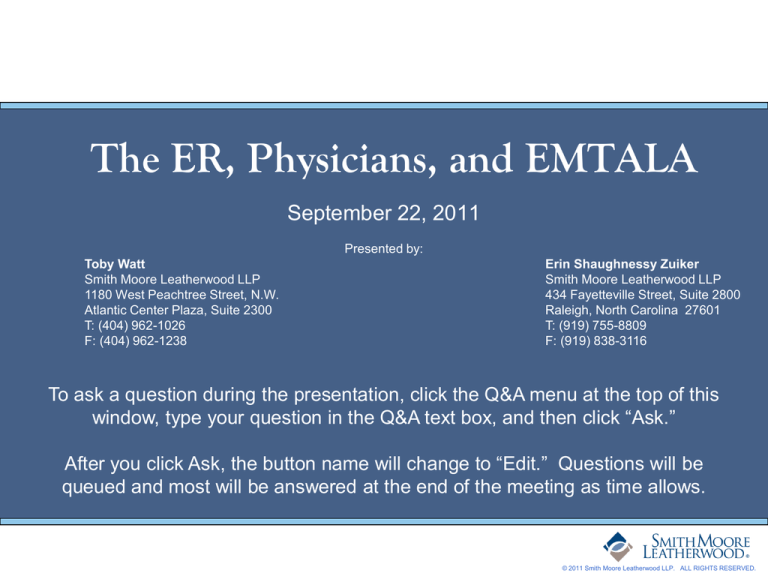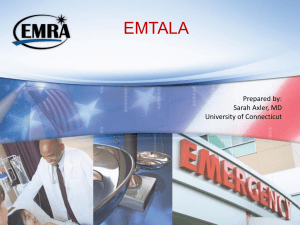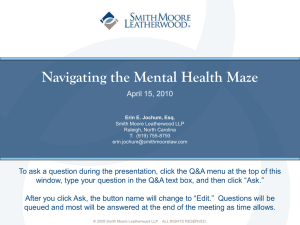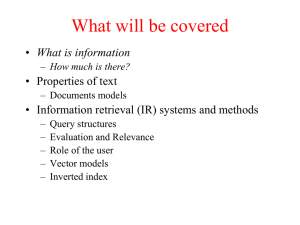
The ER, Physicians, and EMTALA
September 22, 2011
Presented by:
Toby Watt
Smith Moore Leatherwood LLP
1180 West Peachtree Street, N.W.
Atlantic Center Plaza, Suite 2300
T: (404) 962-1026
F: (404) 962-1238
Erin Shaughnessy Zuiker
Smith Moore Leatherwood LLP
434 Fayetteville Street, Suite 2800
Raleigh, North Carolina 27601
T: (919) 755-8809
F: (919) 838-3116
To ask a question during the presentation, click the Q&A menu at the top of this
window, type your question in the Q&A text box, and then click “Ask.”
After you click Ask, the button name will change to “Edit.” Questions will be
queued and most will be answered at the end of the meeting as time allows.
© 2011 Smith Moore Leatherwood LLP. ALL RIGHTS RESERVED.
What Is EMTALA?
• EMTALA is the Emergency Medical Treatment and
Active Labor Act (42 CFR § 489.24)
– Emergency transfer law or “patient anti-dumping” law.
– EMTALA applies to any hospital with an Emergency
Department (“ED”) that participates in Medicare.
© 2011 Smith Moore Leatherwood LLP. ALL RIGHTS RESERVED.
What Does EMTALA Require?
• EMTALA requires participating hospitals to provide
medical screening examinations (“MSE”) within its
capability to all persons who present to the ED and
request service, regardless of that person’s ability to pay
for medical services, to determine if an emergency
medical condition (“EMC”) exists.
© 2011 Smith Moore Leatherwood LLP. ALL RIGHTS RESERVED.
What Is An EMC Under EMTALA?
• An EMC is a medical condition manifesting itself by
acute symptoms of sufficient severity such that absence
of immediate medical attention could reasonably be
expected to result in:
– Placing the health of individual in serious jeopardy.
– Serious impairment to bodily functions.
– Serious dysfunction of any bodily organ or part.
© 2011 Smith Moore Leatherwood LLP. ALL RIGHTS RESERVED.
What Is An EMC With Respect To A
Pregnant Woman Under EMTALA?
• A pregnant woman presenting with contractions is in true
labor and has an EMC if:
– There is inadequate time to effect a safe transfer to
another hospital before delivery; or
– Transfer may pose a threat to health or safety of
woman or unborn child.
• Note - A physician may certify that a woman is in
false labor after reasonable time of observation.
© 2011 Smith Moore Leatherwood LLP. ALL RIGHTS RESERVED.
If An EMC Is Present, What Are The
Hospitals Obligations Under EMTALA?
• Hospitals have an obligation to determine if the individual
who presents to the ED has an EMC.
• If after evaluation, it is determined that the patient has an
EMC, or if a pregnant woman presents in labor, the
obligations of EMTALA continue, AND
• Hospital must
– Treat the patient within the medical facilities
capabilities to Stabilize the patient’s identified EMC;
or
– If the patient cannot be stabilized, the Hospital must
Appropriately Transfer the patient.
© 2011 Smith Moore Leatherwood LLP. ALL RIGHTS RESERVED.
When Is A Patient Stabilized?
• When no material deterioration of the condition is likely,
within reasonable medical probability, to result from or
occur during the transfer of the individual from a facility.
– Hospitals are not required to provide screening
services beyond what is needed to determine if an
EMC exists.
– Hospitals are not required to resolve the underlying
medical condition(s) to achieve stabilization.
© 2011 Smith Moore Leatherwood LLP. ALL RIGHTS RESERVED.
When Does The Medical Screening
Examination End?
• Not an isolated event, but an on-going process.
• Patient’s record must reflect continued monitoring according to
patient’s needs and must continue until he/she is stabilized or
appropriately transferred.
• Should be evidence of evaluation prior to discharge or transfer.
• “If a hospital applies in nondiscriminatory manner…a screening
process reasonably calculated to determine whether an EMC exists,
it has met its obligations under EMTALA.” (CMS Manual, Transmittal
60, July 16, 2010)
© 2011 Smith Moore Leatherwood LLP. ALL RIGHTS RESERVED.
What Is Meant By “within the medical
facilities capability”?
• Includes ancillary services routinely available to
emergency room.
• Includes capabilities of specialists and subspecialists oncall to emergency room and available to provide
treatment necessary for stabilization of EMC.
– Availability of specialists especially a concern in rural
hospitals.
© 2011 Smith Moore Leatherwood LLP. ALL RIGHTS RESERVED.
“Within medical facilities capability”
cont…
• Interpretive guidelines state that participating hospital
that have specialized capabilities or facilities (e.g., burn
units, shock-trauma units, neonatal intensive care units)
may not refuse to accept from a referring hospital an
appropriate transfer of an individual requiring such
specialized capabilities if receiving hospital has capacity
to treat the individual.
© 2011 Smith Moore Leatherwood LLP. ALL RIGHTS RESERVED.
What Is Meant By Capacity?
• Capacity means the ability of the hospital to
accommodate the individual and includes such things as
– Numbers and availability of qualified staff, beds, and
equipment.
– Hospital’s past practices of accommodating additional
patients in excess of its occupancy limits.
© 2011 Smith Moore Leatherwood LLP. ALL RIGHTS RESERVED.
What Is Meant By Transfer?
• Transfer means movement (including discharge) of
individual outside hospital facilities at direction of any
person employed by or affiliated with hospital.
– Transfer does not include:
• Movement of individual declared dead,
• Individual who leaves facility without permission of
any one employed by or affiliated with hospital.
© 2011 Smith Moore Leatherwood LLP. ALL RIGHTS RESERVED.
What Is An Appropriate Transfer?
• A transfer in which transferring hospital provides medical
treatment within its capacity which minimizes risk to
individual’s health (or health of unborn child) in which:
– Receiving facility has available space and qualified
personnel for treatment,
– Has agreed to accept transfer and to provide
appropriate medical treatment,
– Transferring hospital sends to receiving hospital
medical records,
– Transfer is accomplished through qualified personnel
and transportation equipment.
© 2011 Smith Moore Leatherwood LLP. ALL RIGHTS RESERVED.
Does A Hospital Violate EMTALA If A
Patient Refuses Treatment?
• No -- An individual may refuse to consent to examination and
treatment, but only after the hospital offers further medical
examination and treatment and informs the individual of the risks
and benefits of examination and treatment
– But, hospital must take all reasonable steps to secure
individual’s written informed consent to refusal of further medical
examination and treatment.
© 2011 Smith Moore Leatherwood LLP. ALL RIGHTS RESERVED.
When Does The EMTALA Obligation
End?
• EMTALA obligations ends when:
– Physician conducts an MSE and does not identify an
EMC.
– Physician stabilizes the patient and all EMCs are
identified.
– Hospital admits the patient in good faith.
– Hospital provides all treatment within its capabilities
and makes an appropriate transfer.
© 2011 Smith Moore Leatherwood LLP. ALL RIGHTS RESERVED.
Is EMTALA A Federal Malpractice
Statute?
• No -- It is a statute intended only to require screening
and treatment of an identified EMC.
• Unlike under medical malpractice, if a physician makes
an incorrect diagnosis, they have not violated EMTALA.
• If, however, a physician deviates from the standard
screening procedures, a violation has occurred.
© 2011 Smith Moore Leatherwood LLP. ALL RIGHTS RESERVED.
What Are The Call Requirements Under
EMTALA?
• EMTALA requires hospitals to maintain an on-call list of
physicians :
– Who are on the hospital’s medical staff, or
– Who have privileges at the hospital, or
– Who are on staff or have privileges at another
hospital participating in a formal community call plan.
© 2011 Smith Moore Leatherwood LLP. ALL RIGHTS RESERVED.
Can A Physician Who Is On-call Schedule
Elective Surgery During His/Her Call Time?
• Yes -- A physician may schedule elective surgery during
his/her call time or have simultaneous call duties, but to
do so the hospital MUST have policies to provide for
emergency services if the on-call physician is not
available in the event of an EMC.
© 2011 Smith Moore Leatherwood LLP. ALL RIGHTS RESERVED.
If A Physician Is Engaged In A Solo Practice,
What Are The Call Requirements?
• A physician is not required to be on call 24/7.
• In the past, a hospital had discretion to maintain an oncall list that best met the needs of its patients :
– That language was removed as of Oct. 1, 2008
– Now, the hospital must maintain an on-call list of
physicians to provide the necessary treatment “in
accordance with the resources available to the
hospital.”
© 2011 Smith Moore Leatherwood LLP. ALL RIGHTS RESERVED.
What Is Selective Call?
• The practice of an on-call (or off-call) physician who
comes to the ED at his/her discretion to treat a patient.
• Often applies to specialists.
• The patient may or may not be a current patient of the
physician.
© 2011 Smith Moore Leatherwood LLP. ALL RIGHTS RESERVED.
Why Does Selective Call Violate
EMTALA?
• The goal of EMTALA is to provide all patients, paying
and non-paying, with the same level of care.
• Selective call circumvents the intent of EMTALA.
© 2011 Smith Moore Leatherwood LLP. ALL RIGHTS RESERVED.
Myth: If You Have 3 People In A Group, You Are
Required To Come To The ED When Called
Fact: if the physicians in the group are on the hospital’s
medical staff, have privileges at the hospital, or are on staff
or have privileges at another hospital that participates in a
formal community call, then the physician(s) must
participate in the call requirements and come to the ED
when called according to a schedule
© 2011 Smith Moore Leatherwood LLP. ALL RIGHTS RESERVED.
Can A Physician Specialist, Who Is Not On-Call,
Go To The ED If He/She Receives A Call?
• It depends.
• If the physician is not on-call at the time he/she is called to the ED,
in most circumstances, the physician should not go to the ED.
– The physician specialist may go to the ED when called if:
• Another physician specialist is on-call and will be available to
take the next call; or
• The physician specialist goes to see his/her own patient and
is willing to go into the ED for every similarly situated patient;
or
• If the EMC has been stabilized; or
• If the patient has been admitted to the hospital.
© 2011 Smith Moore Leatherwood LLP. ALL RIGHTS RESERVED.
At What Point Does EMTALA No Longer
Apply?
• If no EMC is established.
• If the patient is stabilized.
• If the patient is admitted.
– At any one of these occurrences, a physician
specialist may come to the ED and see his/her own
patient without violating EMTALA.
© 2011 Smith Moore Leatherwood LLP. ALL RIGHTS RESERVED.
How Can A Physician Cure A Selective
Call Violation?
• If a physician agrees to come in for all similarly situated
patients or if a physician of the same specialty is
available for all emergency patients.
– However, this situation would likely create a 24/7 call
requirement
• Also, if the established call schedule did not have
the physician on-call, a surveyor may still
determine the physician and hospital violated
EMTALA by engaging in selective call.
© 2011 Smith Moore Leatherwood LLP. ALL RIGHTS RESERVED.
Is It A Violation Of EMTALA For A
Physician To Refuse To Take Call?
• Yes
• A hospital should specify call schedule in its hospital medical staff
bylaws. Typically those involved will include:
– A physician who is on the hospital’s medical staff; or
– Who has privileges at the hospital; or
– Who is on staff or has privileges at another hospital that
participates in a formal community call plan.
© 2011 Smith Moore Leatherwood LLP. ALL RIGHTS RESERVED.
What Is Shared/Community Call?
• It allows hospitals in areas with fewer specialists to share
the call responsibilities
– It must include:
• Clear delineation of on-call coverage responsibilities,
• Define geographic area included,
• Signed by representative of each hospital,
• Local and regional EMS system protocol includes
information,
• Even if individual arrives at hospital that is not
designated as the on-call hospital, it still has
EMTALA obligations to do MSE and stabilize.
© 2011 Smith Moore Leatherwood LLP. ALL RIGHTS RESERVED.
QUESTIONS??
Toby Watt
tobin.watt@smithmoorelaw.com
Erin Shaughnessy Zuiker
erin.zuiker@smithmoorelaw.com
© 2011 Smith Moore Leatherwood LLP. ALL RIGHTS RESERVED.











